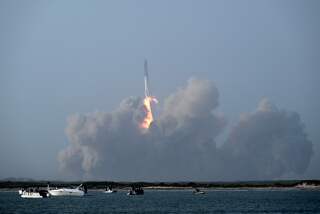SpaceX scrubs rocket launch at Cape Canaveral over technical issues
After suffering through various technical issues with its Falcon 9 rocket, Hawthorne rocket maker SpaceX canceled its scheduled launch from Cape Canaveral.
The company is targeting Thursday at 2:38 p.m. PST for its next launch attempt.
SpaceX, officially named Space Exploration Technologies Corp., was set to lift the SES-8 telecommunications satellite into geostationary transfer orbit -- nearly 50,000 miles from Earth. It would be the first time the company had pulled off the feat.
The launch attempt Monday, which began at 2:37 p.m., was repeatedly stopped and restarted as the company wrestled with various anomalies that popped up. It was officially canceled around 3:30 p.m.
[Updated 5:18 p.m. PST Nov. 25: SpaceX issued a statement: “We observed unexpected readings with the first stage liquid oxygen system so we decided to investigate. The launch vehicle and satellite are in great shape and we are looking forward to the next launch opportunity on Thursday.]
Before the launch attempt, SpaceX said it would be the most challenging mission to date.
In addition to it being the company’s first geosynchronous launch, it would also mark SpaceX’s first launch of its upgraded Falcon 9 rocket, dubbed Version 1.1, from Florida. The company first launched the nine-engine rocket from Vandenberg Air Force Base, about 150 miles northwest of Los Angeles, in September.
SpaceX has already launched small satellites and it has a $1.6-billion contract with NASA to make a dozen unmanned missions to restock the International Space Station. The company has completed three flights so far to the orbiting laboratory.
The SES-8 telecommunications satellite weighs 7,055 pounds and was built by Orbital Sciences. It will provide signals to television and broadband for telecommunication company SES’ customers in Asia.
The Falcon 9 mission will also work toward certifying the company’s rockets so they meet the Evolved Expendable Launch Vehicle program’s stringent requirements.
The company needs three launches on the rocket to break into the Evolved Expendable Launch Vehicle program -- the lucrative business of launching national security satellites for the Pentagon.
United Launch Alliance, a joint venture of aerospace behemoths Lockheed Martin Corp. and Boeing Co., is the currently the Pentagon’s sole launch provider for such missions.
ALSO:
L.A. billionaire Elon Musk protests media scrutiny after Tesla fires
Cold War-era ‘Warthog’ plane targeted for retirement amid budget cuts
More to Read
Inside the business of entertainment
The Wide Shot brings you news, analysis and insights on everything from streaming wars to production — and what it all means for the future.
You may occasionally receive promotional content from the Los Angeles Times.











